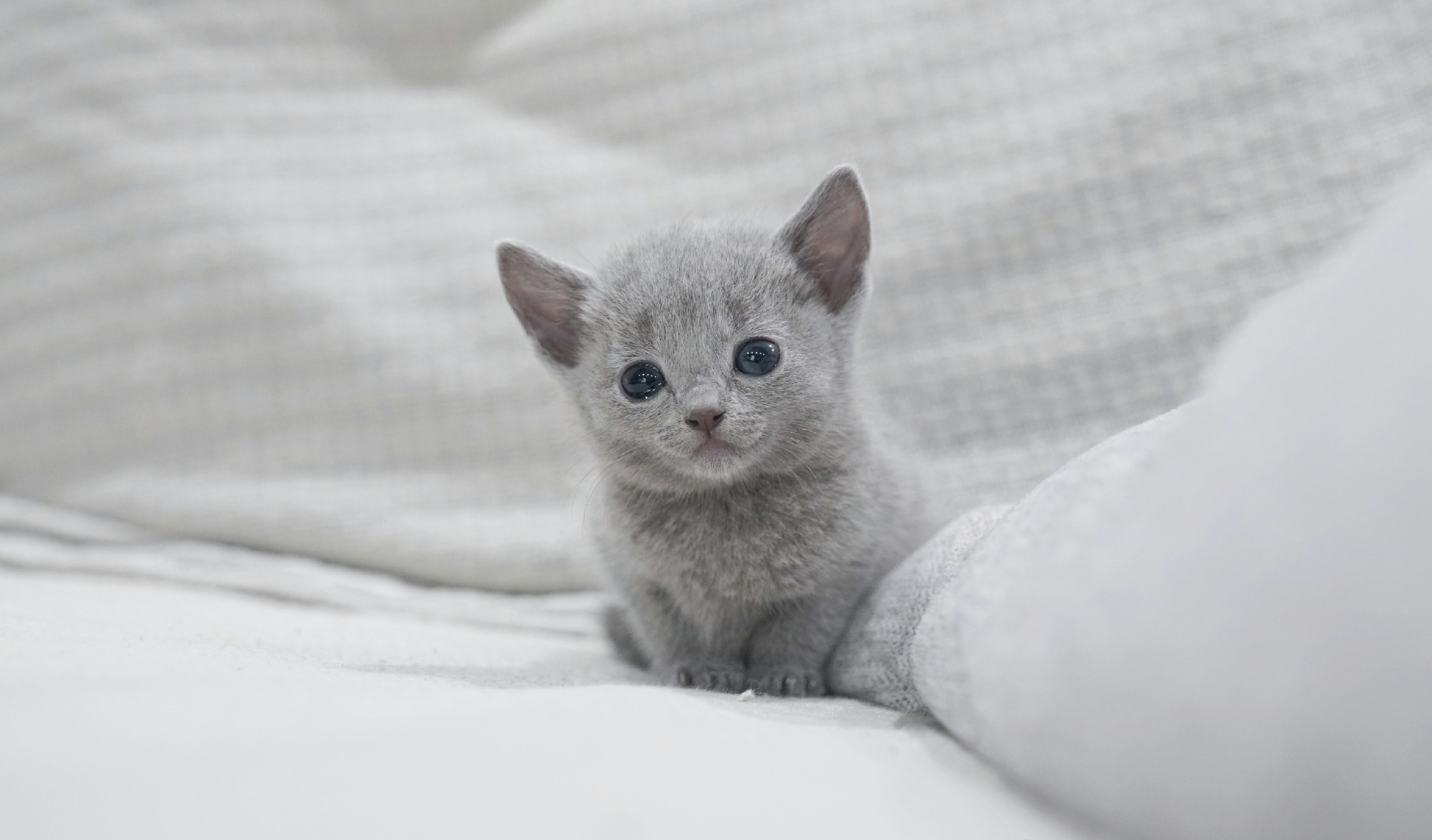This is a common question for prospective owners. Especially if you are thinking of adding a cat to a family with kids or other animals. Let’s see…
Do Russian blue cats bite? Russian blue cats are less prone to nipping or biting than other breeds. Russian blues tend to be very stable cats with even tempers and docile, sociable natures so they bite less.
Cat bites are certainly not fun — how can you avoid them? What makes cats in general bite? Learning to prevent situations where a cat might bite will make you a happier cat owner and will also make for a happier cat. Here’s where we need to delve into some cat psychology. Knowing what makes your Russian blue tick will go a long way to prevent this kind of issue.
“Do Russian blue cats bite?” is really the wrong question to ask.

A better way to put the question would be “Are Russian blue cats more likely to bite people than cats from other breeds?” Based on my own experience and that of other Russian blue fans, the answer to that question is “No.” If anything, the reverse is true — this breed is less likely to inflict bites and other injuries than some breeds.
If the Siamese and the Persian are temperamental movie stars, a Russian blue is the movie star’s best friend: less spectacular but patient, friendly and down to earth. The Russian blue is a very level-headed character and not generally prone to attacks of temper or aggression.
Different cats have different personalities just like people so it’s not impossible to find a cat with a tendency to bite. It’s just less likely. Anecdotally, I’d have to say that Russian blue cats are some of the gentlest and sweetest felines I’ve ever had the pleasure of meeting.
They might not be as elegant as a sphinx or as fetchingly fluffy as a longhair breed but there’s nothing quite like a Russian blue for loving kitty companionship.
Every Russian blue I’ve owned has been a real character in their own right, but they’ve all had docile, tractable natures that make them perfect pets. A Russian blue is a great choice if you’ve never owned a cat before or if you’re uncertain about adding a new cat to your current furry friends.
They’re patient with fellow cats and other animals and do very well around children. I’ve lived with several of these wonderful cats over the years and only been bitten once or twice. (Even then it was only when trying to put the cat in a carrier, which surely constitutes intolerable provocation.)
Russian blues tend to be patient and will tolerate a certain amount of teasing — that’s why they’re a good pet for households with children — but a cat who is being teased or provoked may still bite.
Every cat has some limits, even the friendly Russian blue. She may nip as a warning if she doesn’t like something that’s happening; a cat’s teeth are usually not sharp enough to break the skin by accident, so if she draws blood the situation is quite serious
If your Russian blue feels threatened and scared, she may decide to defend herself with claws or teeth. A cat who is defending kittens may become nervous and aggressive, even if she wasn’t before. Another factor can be the cat’s health: a sick cat may act out and scratch or bite, either for attention or because she’s in pain and doesn’t understand what’s happening.
Painful injuries or conditions like cystitis can be behind aggressive behaviour and biting. Sadly, aggressive behaviour can also be a sign of a more serious problem such as dementia.
Why is your Russian blue biting a family member?
If the cat is biting a particular person, it might be a good idea to supervise their interactions for a while to see if they’re inadvertently triggering the cat’s self-protective instincts. Even if someone isn’t trying to hurt or upset the cat, they may simply not know how to treat their feline friend properly.
As an example: I was once asked for advice about a kitten who’d taken to nipping his owners, a mother and young daughter; it turned out that both were in the habit of scooping the cat up while shrieking endearments at an ear-splitting volume and not letting him go when he struggled. They were then absolutely astonished when the “mean kitty” would claw, bite and then run off to hide behind the sofa.
I had to gently explain that they were scaring the ginger fuzz off their “mean kitty” by screaming and grabbing him. They genuinely adored him but neither of them knew enough about cats to understand that what they saw as affection was stressing and hurting him. Better handling stopped the biting, although the poor cat remained skittish and less fond of petting than the typical Russian blue.
Why bite at all?
Cats bite for two main reasons: play and aggression. Sometimes a cat doesn’t understand that her playful nips are actually hurting you — she thinks you’re having fun and will stop if you let her know you’re not comfortable. Just say “Ouch!” and remove your limbs from the danger zone.
Aggressive bites are different. These happen when a cat is angry or trying to fend off something that looks like an attack. A cat that hasn’t been properly socialised (such as a feral cat or one who was abused or neglected as a kitten) may interpret any human interaction as a threat. By nature, all domestic cats are social — that’s why feral cats tend to form colonies.
A happy domestic cat regards its human family as colony mates; an abused cat, or one that hasn’t had any exposure to humans in kittenhood, may struggle to see humans in this way. This is why it’s very important to know your Russian blue’s background — a kitten from a bad breeder or a mature cat from a problem home may give you trouble.
If your Russian blue does seem aggressive, it’s important that you don’t respond by punishing her. If you do something that hurts or frightens her, you’re confirming her worst fears.
Is a Russian blue a safe cat for your family?

They’re wonderfully loving, affectionate, caring creatures. They readily become attached to humans, from the oldest to the youngest members of your household. Their love and loyalty are expressed not just through physical affection but little gestures like meeting you as you get home from work, or coming to see you when you’re unhappy.
Russian blues are healthier and less disease-prone than most breeds; they also live for quite a good spell (14-20 years), making them one of the longest-lived cat breeds and a good choice for a long-term companion. Yes, they may playfully nip, but they’ll stop if you’re not comfortable.
These friendly, communicative cats are playful and non-aggressive, with loving natures that are ideal for a family pet. If you’re ready for a cat, you’re more than ready for a Russian blue.
Related Questions:
Why do cats bite gently?
In most cases, this is a sign of love and respect from your Russian blue. Kittens are often gently bitten and licked by the mothers and in older age, they will pass the same behaviour onto human owners (if deserved of course).
Why do cats bite feet in bed?
Cats are hunters and always looking for the pray, or they just want to play. What’s more entertaining and worth a good “hunt” in a dark bedroom than your feet sticking out from under the duvet? 🙂 Remember do not punish your Russian blue for this, this is a part of his nature and by accepting him into your family, you must accept this as well.
Is a cat bite dangerous?
In most cases not. If it is a healthy indoor cat then you do not have to worry about anything. Especially if this is one of these “playful bites”. If on the other hand, you were bitten by an unknown cat that you know nothing about – you should see a doctor as this might cause an infection.
How do I get my cat to stop attacking me?
Make sure your Russian blues get a lot of attention and play time:
- Play with your Russian blue daily at scheduled times (20-30 minutes minimum)
- Try to provide some external stimulation (allow access to the window, balcony or a garden)
- Get some new toys
- Stop playing if it gets too rough, this will send a message that this type of behaviour is not rewarded.
- Never punish your Russian blue




